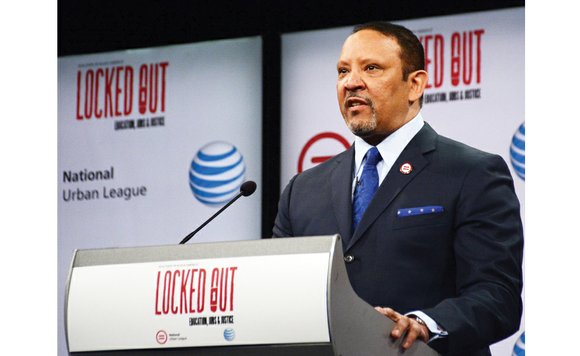National Urban League issues annual State of Black America report
5/26/2016, 6:25 a.m.

By Hazel Trice Edney
WASHINGTON
Declaring that the state of black America is “locked out” of economic, social and educational equality, National Urban League President and CEO Marc Morial said in his State of Black America Address last week that at least $1 trillion must be invested in America’s urban communities in order to bring a semblance of justice.
“As President Obama wraps up his final months as the nation’s first African-American president, we begin to assess the progress black America has made under his administration. How well has the nation recovered from the worst economic crisis it has seen in generations? How much closer to the goal of universal health care coverage has the Affordable Care Act, or Obamacare, gotten us?
“As President Obama himself said in his commencement address at Howard University, ‘My election did not create a postracial society.’” Mr. Morial said. “Mr. President, you are right. The 2016 National Urban League Equality Index tells an all too familiar story of persistent racial disparity in American life. Your presidency has made a difference, yet we cannot, in eight short years, eliminate America’s long-standing challenges around racial inequity.”
An enthusiastic audience of hundreds packed into the Newseum’s Knight Studio in Washington on May 17 in commemoration of the National Urban League’s 40th Annual State of Black America.
“With this milestone 40th Anniversary State of Black America, the National Urban League proposes a sweeping and decisive solution to the nation’s persistent social and economic disparities. We call it the ‘Main Street Marshall Plan: Moving from Poverty to Prosperity,’ ” Mr. Morial said in the speech, which also was livestreamed and televised on C-SPAN. “This bold and strategic investment in America’s urban communities requires a multiannual and multipronged commitment of $1 trillion over the next five years that would course correct our main streets.”
The following are some of the $1 trillion solutions outlined in the National Urban League’s report:
• Universal early childhood education
• A federal living wage of $15 per hour, indexed to inflation
• A plan to fund comprehensive urban infrastructure
• A new Main Street small- and micro-business financing plan focusing on minority and women-owned businesses
• Expansion of summer youth employment programs
• Expanded homeownership strategies
• Expansion of the Earned Income Tax Credit
• Targeted re-entry workforce training programs administered through community-based organizations
• Doubling the Pell Grant program to make college more affordable
• Expansion of financial literacy and homebuyer education and counseling
• Expansion of the low-income Section 8 housing voucher program
• Establishment of Green Empowerment Zones in neighborhoods with high unemployment
• Affordable high-speed broadband and technology for all
• Increased federal funding to local school districts to help eliminate resource equity gaps.
Mr. Morial’s speech was punctuated with graphics, including a video to stress the pains experienced by African-Americans in areas such as police killings of unarmed people.
Another graphic was a photo of Vernon Jordan, the former National Urban League executive director from 1971 to 1981, who introduced the State of Black America report in 1976.
Mr. Morial referred to that time, when Mr. Jordan rolled out the first report as a message to the next president. He quoted Mr. Jordan:
“It is our hope that this document will pierce the dark veil of neglect that has thus far smothered efforts to right the wrongs of the past and the present. I hope that it will be read closely in the White House and in Congress, that it will influence decision makers to open their eyes to the plight of black Americans. I hope it will be read by all the candidates in both political parties whose campaigns largely exhibit a refusal to grapple with the concerns of black citizens. I urge black people to educate themselves to the issues, to register, and to vote in the upcoming primaries and election. For this election could be the most crucial in recent history for black people. The implications of the mass impoverishment of blacks and the massive assault on our newly won rights demand that every black vote be mobilized in defense of black interests and aspirations.”
Mr. Morial concluded, “My message to the next president is this: The disparities are real. The conditions are tough. The times demand real leadership. Does our nation have the leadership and the will to confront yesterday’s problems, to forge a better tomorrow?”






